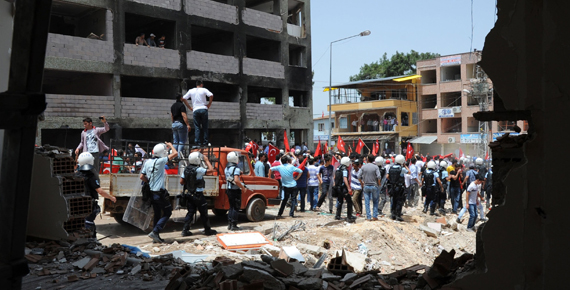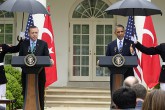For over two years, Syria has preoccupied our country’s agenda more than ever. We are going through a period in which the Syrian cities appear on TV channels more than some of ours do. Idlib, Dera, Rakka Lazkiya and Dairisor etc… The Syrian cities whose names have not been heard by a vast majority in Turkey are on our agenda. However, this is nothing new for people who live near the south and south-eastern borders of Turkey. Our south and southeastern borders portray this interpenetration of centuries. Turkish cities of Hatay, Gaziantep, Kilis, Sanliurfa, Sirnak, etc. also symbolize the synergy which could not be divided by the borders of the nation-state.
To the contrary of those who have just heard the names of the Syrian cities Aleppo, Idlib and Lazkiya, for a person in Samandagi Lazkiya has a special meaning, Lazkiya or Idlib has a special meaning for a person in Yayladagi or Altinozu; for one in Reyhanli, Aleppo and Idlib; for one in Kirikhanli and Kilis or Gaziantep, Aleppo; for Sanliurfa, Rakka; or for one in Haseke, Mardin and Sirnak, Kamisli are not “foreign cities” at all. Economic ties, social synergy and geographic proximity have naturally made these provinces “sister cities” on the two sides of the border, in Turkey and in Syria, by virtually disregarding nation-state borders. To that end, it is impossible in Reyhanli or Altinozu not to be affected by an event in Idlib, or not to feel in Kilis and Samandagi the pain of people in Lazkiya and Aleppo.
Owing to this interpenetration, our border cities in general and Hatay specifically have gained distinctive qualities. Being multi-cultural, habit of living together, ability to transform ethnic-religious-sectarian diversities into richness are totally reflected in daily lives, trade and social relations as well as in the way of how the region’s people read the world. On the other hand, Hatay has a special place. Annexed by Turkey in 1939, Hatay is our only province which has not been victimized by the early Republican period’s homogenization policies that ruined multi-culturalism.
HATAY AND THE SYRIAN CRISIS
Hatay facing the Syrian crisis with this social-economic and historic background naturally could not stay out of the developments in Syria from the beginning. On one side, the city has tackled with social-economic difficulties caused by the flock of refugees and been harmed by losing their income source, Syria. For instance, the freight sector, which is the number one item on the city’s economy, has come to a stop due to the Syrian crisis. The Syrian refugee flock has also introduced an array of real-life problems in health and real-estate sectors, in law-and-order, and even caused inner family disputes. Syrian refugees living in basement flats or in parks, working as temporaries, as well as cars possessing Syrian registration plates have become an ordinary part of the daily life in Hatay. Ironically though, the majority of the population who personally face the refugee issue in Hatay have found meaningless the argument of the those who say “If we had not accepted the Syrians…”, for the aforementioned reasons. In other words, residents of Hatay are among those who know best the fact that we could not refuse the Syrian refugees.
With the admission of the Syrian refugees by the locals in Hatay, efforts have been exerted to stimulate the fault lines as the relationship between two sisterly peoples has been tested on two main grounds. Especially in Antakya urban legends were made up to instigate people against the Syrian refugees. Although this attempt was not successful, real social-economic issues of Hatay were obfuscated by the virtual agenda created. The point that needs to be emphasized is that all parties in Hatay, from Alevis to Sunnis, are sharing a common life with the Syrian refuges though they complain at times.
The second critical point is the attack in the town of Reyhanli. Efforts to create hostility between the two communities h



